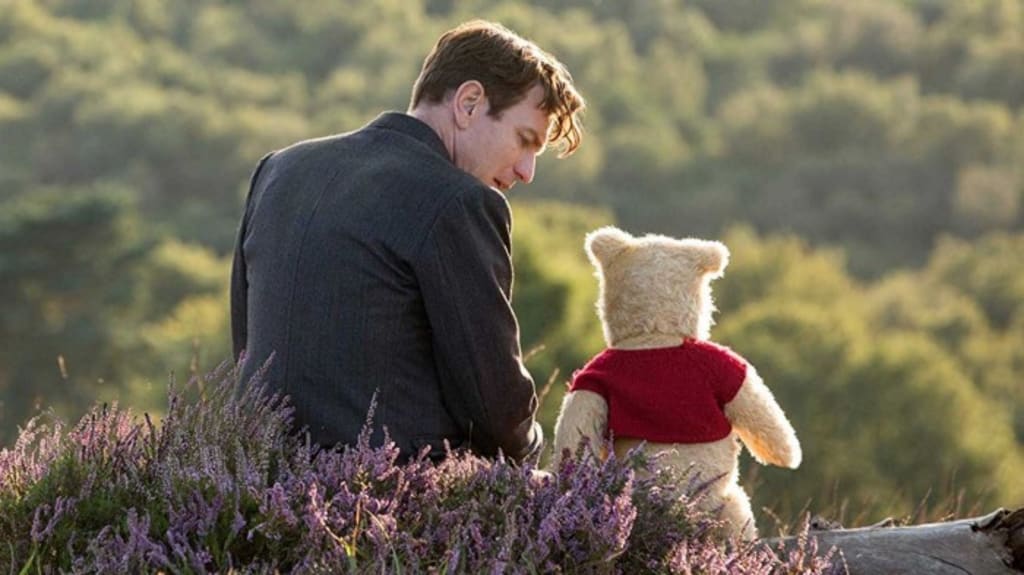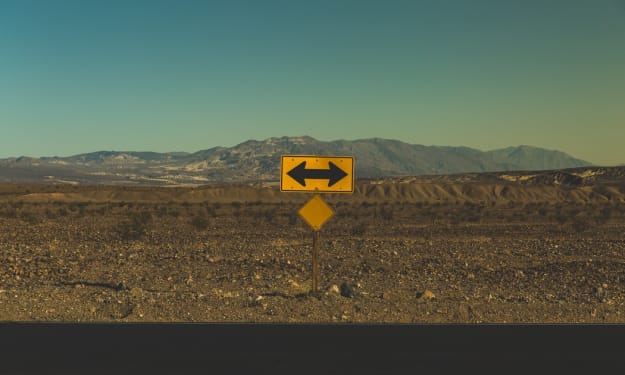Christopher Robin Reminds Us How to be Human
Sometimes we need to press pause on the “real” world to reconnect with ourselves and our imagination.

Snap Back To Reality
I recently watched the 2018 film Christopher Robin starring Ewan McGregor, who returns to the Hundred Acre Wood as a grown up Christopher Robin. Stressed about his job and family, he starts the film off in a destructive frenzy, rushing to help Winnie the Pooh find his friends. He did this not for the sake of adventure, but purely so he could get to work on time. He even grows impatient and yells at Pooh, which made my soul cry a little bit. It was a sobering jolt that stirred up some very uncomfortable emotions.
This is what the filmmakers wanted. Why? It’s because Christopher Robin is a reflection of ourselves. He’s so caught up in the hectic adult life that he has forgotten what speaks to him emotionally. He becomes hostile toward the things that gave him the most joy as a child.
Are we so different? How often do we press pause on the “real” world to do what makes us truly joyful like we did in our childhood? Does anyone even remember when childhood ended and adulthood began? Or is it all just a blur?
This is a lot to think about. But, in traditional Pooh Bear fashion, Christopher Robin offers a valuable life lesson.
Less Is More
“Doing nothing often leads to the very best of something.” -Winnie the Pooh
Christopher Robin reminds us how important doing nothing is. How often do you take time to do nothing at all? Seems counterproductive, right? After all, it isn’t what responsible adults are supposed to do. But think about it. How inspired, refreshed, or happy are you when you’re on your work grind 24/7? Sure, it might be enjoyable to those few extreme workaholics out there. However, for the rest of us I’d say it’s pretty draining.
Doing nothing is a form of meditation in its own right. When we give our mind a break, it is free to get in touch with that imagination we so often forget about. We can freely process our thoughts and ideas and allow new ones to emerge. It even gives us a feel-good boost when our minds aren’t spinning on overdrive. It allows us to tune in to the world around us. We notice the little things: the sunlight on the leaves, fog gently rolling over the hills, singing birds, or even the artistic finesse of modern architecture.
If you’re an introverted creative type like me, doing nothing is rejuvenating. It restores my energy and allows my thoughts to unfold and flow naturally. I try to find dedicated relaxation time everyday. For me this means waking up a few hours earlier than I normally would and moving through my morning very slowly. I’ll read books, listen to podcasts, and write out my thoughts. And once I feel awake, I’ll do nothing for a bit. It’s amazing. When it’s time to get to work I have plenty of vitality, fresh ideas and new inspiration.

“I can’t think of a single person who I would consider to be inwardly peaceful who doesn’t carve out at least a little quiet time, virtually every day. Whether it’s ten minutes of meditation, yoga, spending time in nature, or locking the bathroom door and taking a ten-minute bath, quiet time to yourself is a vital part of life.”
-Dr. Richard Carlson
In his book Don’t Sweat the Small Stuff…and it’s All Small Stuff, Dr. Richard Carlson recalls when a friend told him “People are no longer human beings. We should be called human doings”.
He offers us the advice that a therapist once gave him: allow yourself to be bored. He reminds us of the peace that lives in those quiet moments when we aren’t running around all over the place trying to keep up with our responsibilities and obligations.
Sometimes those things are a necessary part of the culture we live in. But they don’t need to take up all of our time and energy. We are indeed human beings, so it’s crucial that we take time to simply be.
Why Wait?
Not to get too dark here, but look at terminal cancer diagnosis. When people are told they have terminal cancer they undergo a sudden priority shift. They immediately value the small parts of life and choose to pursue their abandoned passions. Their superficial concerns fade away and they embrace the abstract part of their mind. In Steven Pressfield’s The War of Art, Tom Laughlin explains this shift as an expansion of consciousness in terms of the Jungian “Ego” and “Self”.
The Ego is associated with “I” and “me” and addresses our surface-level material concerns. When we’re constantly caught up in work to earn a paycheck, this is the extent of our consciousness. The Self, however, encompasses our dreams and intuitions; it is our unconscious mind. It’s where our imagination, our creativity and abstract thoughts live. It’s the greater of the two consciousnesses.
The Self is always with us, and always has been. So why does it take the promise of premature death to convince us to embrace it? Why do we spend our entire lives living as a fraction of our true selves, waiting until we are old, frail, and on the edge of death to finally do what we love?
“Through the unknown, unremembered gate
When the last of earth left to discover
Is that which was the beginning…”
-T.S. Elliot
It’s like that T.S. Elliot quote up there. However, instead of discovering our origins after we’ve done it all, we’re scrambling to catch up on everything we missed before we run out of time. And we all run out of time eventually. So why not spend your functional life doing what matters to you?

You Don’t Have to Grow Up
Let’s learn from Christopher Robin and reflect on what matters most to us. Think about what makes you feel good. And I’m not just talking about conceptual adult goals like “financial security” or a nice paycheck. Sure they are important, but I’m talking about specific activities that genuinely make you smile, that restore your sense of childhood wonder, that draw you in and make you forget about the “real” world for a bit.
There’s a reason we love sci-fi and fantasy, reading books, watching movies, playing games, traveling, telling stories, and listening to music. It’s because the child inside us never went away. That child is more in tune with true human nature than our adult self.
We don’t need to trade in our dreams or our will to explore for the mundane materialistic life. We don’t have to live in the artificially constructed adult world all the time.
Our imagination is as brilliant as it ever was. It’s up to us to give that imagination a chance to breathe again. Then we can take a moment to have fun with it and explore, and remember who we really are.
About the Creator
Uniquely Human
Empowering creatives and helping humanity get back in touch with its egalitarian roots. We are capable of far more artistry and compassion than society allows.






Comments
There are no comments for this story
Be the first to respond and start the conversation.